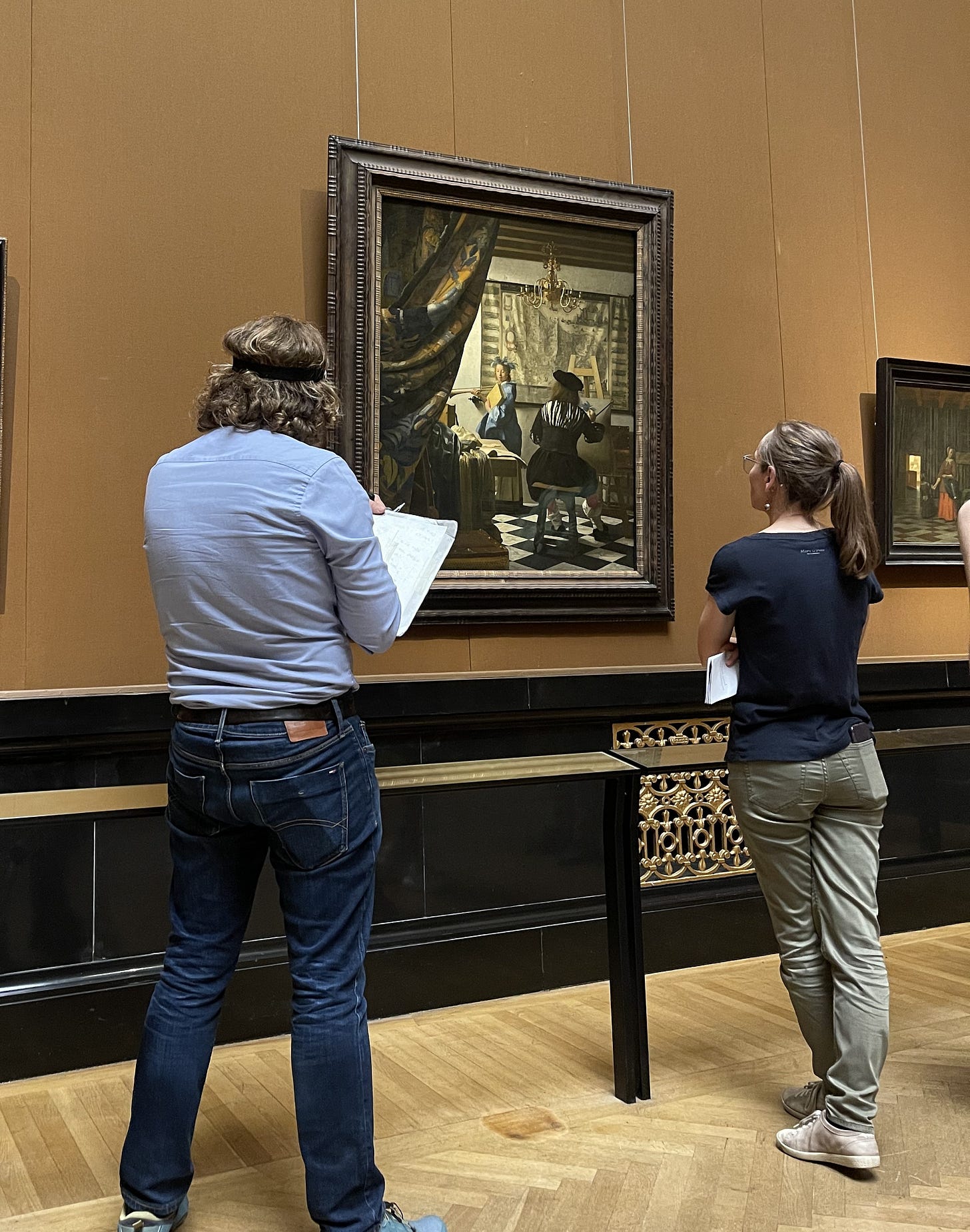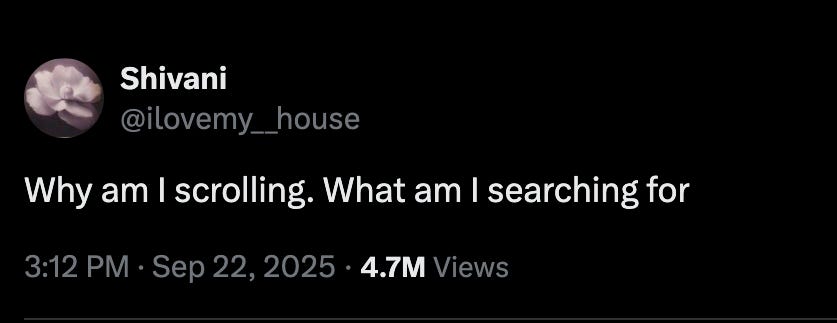You’re bored because you don’t love anything
Breaking out of that feeling of living the same day over and over again
You’re doomscrolling because you’re looking for something to transform you but you can’t stay with one thing for long enough to be transformed by it. You have short attention span on an existential scale. You’re gliding past thousands of small worlds in minutes, laughing at one post, feeling dread at the next, tempted to buy something right after. There’s no plot, no mission, no finale.
Ennui is a floating sensation, moving forward in time indefinitely with no direction. You’re dying with the potential inside of you kicking and screaming to be expressed in great creations. Everything looks interesting for a second, then, nothing does. There’s so much to see yet none of it leads anywhere. You’re awake but half-alive, like being cursed to exist forever with nothing to really live for.
It’s an apathy that convinces you everything worth doing has already been done, and you’re not that important. You don’t want to die, just disappear for a while. You’d like to hibernate until fate intercedes, except you can’t imagine surrendering your sense of agency. You feel duller than a statistic, smaller than a worker bee, yet somehow still more precious than the next person.
The Other
We don’t love anything anymore because the Other has disappeared. When love flattens into a recipe for enjoyment, “love” becomes self-indulgence. When the Other disappears, things become mirrors instead of portals: everything reflects what you already know instead of transporting you somewhere else. After all, isn’t that why Eros—desire—has wings, so he can take you yonder?
Without the Other, everything becomes the smooth surface of selfhood. Today, love means satisfaction and security, not desire or renewal. We refuse to be changed, even if we want to be. Business-speak has taken over our personal lives: a human is a consumer or a user, and the world has become one big product. There’s no more wonder because mysteries have become “problems” that need to be solved (eg. effective accelerationism). Even romantic love has become something to be consumed instead of experienced (e.g., using dating apps to feel confident). People are using each other to benefit themselves. People are consuming people while packaging themselves to be consumed by someone else. (e.g., date-me docs)
The meeting of two personalities is like the contact of two chemical substances: if there is any reaction, both are transformed.
— C. Jung
Encountering the Other is always an interruption. It breaks the loop of self-recognition. Love asks for surrender, not balance. You “fall” in love because standing still would mean remaining the same.
August 7, 2025. Kunsthistorisches Museum, Vienna.
Ben and I spent most of that day wandering the upper levels of the museum of art history. Each grand room bore the name of a star artist, but when we reached the “Vermeer” room, there was no Vermeer. “It’s definitely there, we just didn’t see it,” Ben said, so we circled back, retracing every corridor to find it.
In the search, the Vermeer became holy—literally, set apart. Everything else turned ordinary by comparison. It wasn’t that the other works lost their beauty, only their claim on our attention. In that search, nothing else mattered except for Vermeer. Finding the Vermeer became the day’s salvation, the promise that our wandering and wanting would be redeemed. It meant that our long trek and our painful longing for it in its absence would all be worth it.
Perusing the galleries felt like….doomscrolling: looking, checking, moving on. We breezed past tourists contemplating Raphaels and we scrolled past Titians and Veroneses. When I open Instagram or Twitter, I feel like I’ve entered a gallery, except, I don’t know what I’m there for. Why am I scrolling? What am I searching for? Ennui is the absence of a promise. Restlessness haunts the seeker who doesn’t know what they’re pursuing.
At last, we found the Vermeer. We stood in front of it and it awed us. Part of the satisfaction was that it met our desire to look for it. Seek and ye shall find. We sought, and we found.

What we’re all looking for is that existential Vermeer, the thing that exists not to be used but to be with, that invites us to revel in it. The thing that’s worthy of a long search. The journey of desire is glorified in hindsight.
Eros, in its original Greek meaning, is the principle of attraction. Desire is always a pull, and it’s pulling you towards beauty, or some big realization that can move your heart—it’s the feeling of being raptured out of your own body. Love feels like a convergence: everything begins to merge toward the core. All the arrows point in one direction, and life feels charged with purpose, like there’s a kind of eternity to look forward to. It’s why depression often feels like living the same day over and over again, like there’s no future you’re bound for, like there are no tomorrows. The Self is circular while the Other is linear.
Yet, Eros can be terrible. Yearning can leave us in despair, it can cost us extremely painful levels of awakening. Yet, we reach for it over and over again. Why? Because love feels like hope. The verb that comes before love is always “fall”—we want to surrender even knowing it might break us. It’s why the sensation of love is described as being shot by Cupid’s arrow. Love begins with getting shot because it requires a death of the Self. Italian literature plays with the words amore, love, and morte, death, because they can’t be talked about separately. How can love enter without a wound?
Encountering the Other is meeting a portal, an invitation to give ourselves up in order to be changed. The Other is not something we try to have, it’s something we try to be with.
Passion (passio) means to suffer—to make love into labor, creation, offering. The body can endure hard work, but it’s the soul that collapses under ennui. Burnout is the slow suffocation of pretending, it’s the mind revolting against living on autopilot.
Someone once told me, “God breaks your heart so He can enter through the cracks.” Desire—the pain of knowing you lack something—lets in a spirit that pulls you towards tomorrows full of hope. In bouts of deep existential boredom, what you really need is to be wounded by something that makes you feel fully human, fully alive.
Would you rather remain the same, or let the agony of love break you into pieces so you can be changed by the Other?
In the same vein:








Despair is born at the precise, pitiful moment you realize your life has become a long surrender to cheap dopamine. That your every choice has favored the path of least resistance. That your words and actions have drifted miles apart. That your feet have not once trod the road less taken. It’s at that moment you realize that hell is not a destination, but a sorrowful way of living. The only way out is Kierkegaard’s leap of faith — get moving!
Don't you find it strange that in our perusal of galleries on social media, the idea of getting bored is encouraged so as to find that insightful idea in your field, and yet, you talk about boredom in a different light?
Your message is clear. However, as for the tweets, notes, or brief posts that encourage people to be comfortable with boredom, I have never subscribed to that idea. You need to be passionately obsessed with a problem. Boredom doesn't inject potential pathways into your subconscious.
As you've said, there must be a wound. Indeed, a desire to raise one's bar, to solve a deep problem, to find a bug in a code is not boredom. Passion allows us to fall for a "Vermeer".
As always, I have to sit down to read your work. 🥂